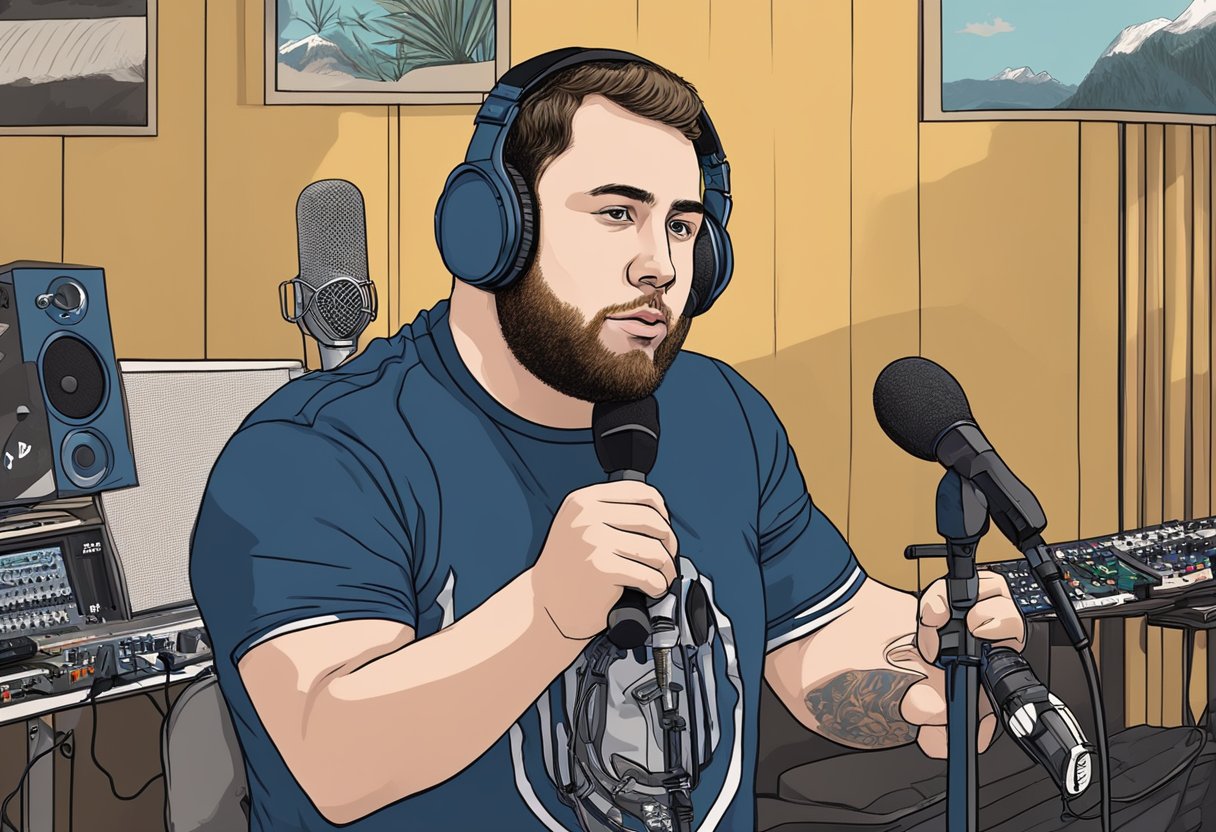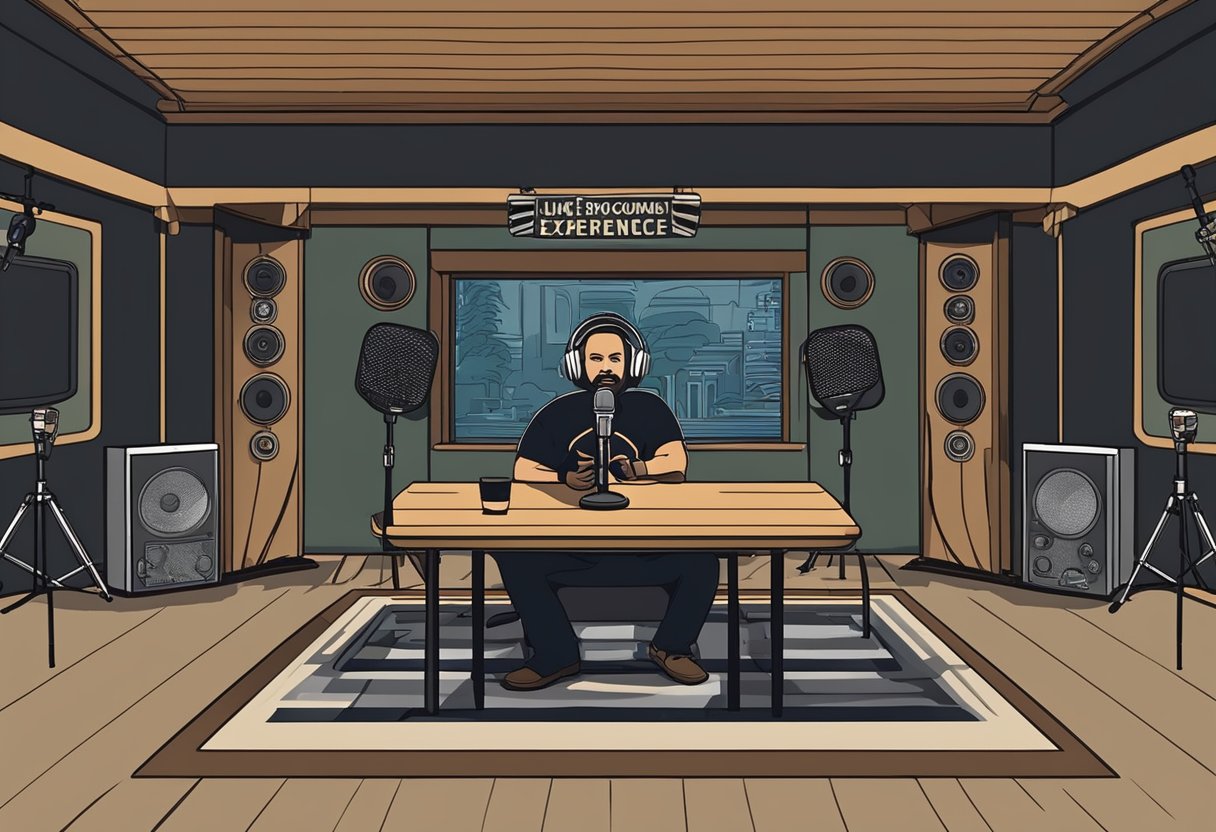
Luke Combs
Luke Combs is an American country music singer and songwriter. Born and raised in North Carolina, Combs began performing as a child, most notably performing at Carnegie Hall. After dropping out of college to pursue a career in music, he moved to Nashville, Tennessee, where he released his debut extended play, The Way She Rides, in 2014. In 2017, Combs released his debut album, This One's for You, which reached number four on the Billboard 200. Combs released his second album, What You See Is What You Get, on November 8, 2019. The album topped the charts in multiple territories, becoming his first to do so. A deluxe version of the album was released on October 23, 2020, including the song "Forever After All".
Joe Rogan Podcast: Luke Combs Talks Music and Life
The Joe Rogan Experience is one of the most popular podcasts in the world, with millions of listeners tuning in each week to hear Joe Rogan's conversations with a wide range of guests. In episode 1956, Joe Rogan sat down with country music superstar Luke Combs to discuss his career, his creative process, and his struggles with OCD. The conversation was wide-ranging and fascinating, touching on everything from the music industry to mental health.

For those who are unfamiliar with The Joe Rogan Experience, it is a long-form podcast that features in-depth conversations with a wide range of guests, from comedians and actors to scientists and politicians. The show has become known for its thoughtful discussions and Joe Rogan's ability to get his guests to open up and share their thoughts and experiences. With over 1,500 episodes and counting, The Joe Rogan Experience has become a cultural phenomenon and a must-listen for anyone interested in thoughtful, engaging conversation.
Luke Combs is one of the biggest stars in country music today, with multiple chart-topping albums and hit singles to his name. He is known for his powerful voice, his relatable lyrics, and his ability to connect with audiences all over the world. In his conversation with Joe Rogan, he opened up about his creative process, his struggles with OCD, and his thoughts on the state of the music industry. The conversation was both entertaining and insightful, giving listeners a unique window into the mind of one of the most talented musicians of our time.
Key Takeaways
- The Joe Rogan Experience is a popular podcast that features in-depth conversations with a wide range of guests.
- Luke Combs is a country music superstar known for his powerful voice and relatable lyrics.
- In his conversation with Joe Rogan, he opened up about his creative process, his struggles with OCD, and his thoughts on the state of the music industry.
Overview of The Joe Rogan Experience

The Joe Rogan Experience is a popular podcast hosted by Joe Rogan. The show started in 2009 and has since become one of the most listened-to podcasts in the world. The show has featured a wide range of guests, including comedians, actors, musicians, scientists, and politicians.
Podcast Format and Popularity
The format of The Joe Rogan Experience is a long-form conversation between Joe Rogan and his guests. The show typically lasts between two and three hours and covers a wide range of topics. The podcast has gained popularity due to its conversational style, which allows guests to share their thoughts and ideas in a relaxed and informal setting.
The show's popularity has grown over the years, with millions of listeners tuning in to each episode. The show is available on a variety of platforms, including Spotify, which signed a multi-year exclusive deal with Rogan in 2020.
Joe Rogan's Interview Style
Joe Rogan's interview style is known for being conversational and relaxed. He is known for asking his guests to share their thoughts and ideas on a variety of topics, ranging from politics and current events to science and technology. Rogan's style allows guests to share their opinions freely, which has led to some controversial moments on the show.
Overall, The Joe Rogan Experience is a popular podcast that has gained a large following due to its conversational style and wide range of guests.
Who Is Luke Combs?
Luke Combs is a singer/songwriter who has made a name for himself in the country music scene. He was born on March 2, 1990, in Charlotte, North Carolina. Combs developed an interest in music at a young age and began playing guitar when he was just 21 years old.
Rise to Fame
Combs' rise to fame began in 2014 when he moved to Nashville, Tennessee, to pursue a career in country music. He released his debut single, "Hurricane," in 2015, which quickly gained popularity and earned him a record deal with Columbia Nashville. The song was later included on his debut album, "This One's for You," which was released in 2017.
Since then, Combs has released several chart-topping hits, including "When It Rains It Pours," "One Number Away," and "Beautiful Crazy." He has also collaborated with other country music artists, such as Brooks & Dunn, Eric Church, and Kane Brown.
Awards and Recognition
Combs has received numerous awards and recognition for his work in country music. In 2019, he won the Country Music Association (CMA) Award for New Artist of the Year. The following year, he won the CMA Award for Male Vocalist of the Year and Entertainer of the Year.
In 2022, Combs was named the Country Music Association Awards Entertainer of the Year, cementing his status as one of the biggest names in country music. His success has made him a household name and a favorite among country music fans.
Frequently Asked Questions

What methods did Luke Combs use for weight loss?
Luke Combs has lost a significant amount of weight over the years. He has credited his weight loss to a combination of exercise, healthy eating habits, and cutting back on alcohol consumption. Combs has also mentioned that he uses the help of a personal trainer to stay on track with his fitness goals.
Has Luke Combs ever discussed his weight loss journey on the Joe Rogan podcast?
Yes, Luke Combs has discussed his weight loss journey on the Joe Rogan podcast. In episode #1956 of the Joe Rogan Experience, Combs talks about how he used to live a sedentary lifestyle and how he made the decision to change his habits. He also discusses how he stays motivated to maintain his weight loss.
What topics did Joe Rogan and Luke Combs cover in their podcast episode?
In addition to discussing Combs' weight loss journey, Joe Rogan and Luke Combs covered a range of topics in their podcast episode. Some of the topics they discussed include Combs' rise to fame in the country music industry, his songwriting process, and his experiences touring.
Did Luke Combs have weight loss surgery, or was it a different approach?
Luke Combs did not have weight loss surgery. Instead, he used a combination of healthy eating habits, exercise, and cutting back on alcohol consumption to achieve his weight loss goals.
Which Joe Rogan podcast episode is considered the best, and does it feature Luke Combs?
It is subjective to determine which Joe Rogan podcast episode is considered the best, as it depends on personal preferences. However, episode #1956 featuring Luke Combs is a popular episode among fans of the podcast.
How does Luke Combs balance his personal life and career, including his family?
Luke Combs has mentioned in interviews that he tries to balance his personal life and career by prioritizing time with his family. He has also mentioned that he tries to stay grounded and not let his success go to his head.

